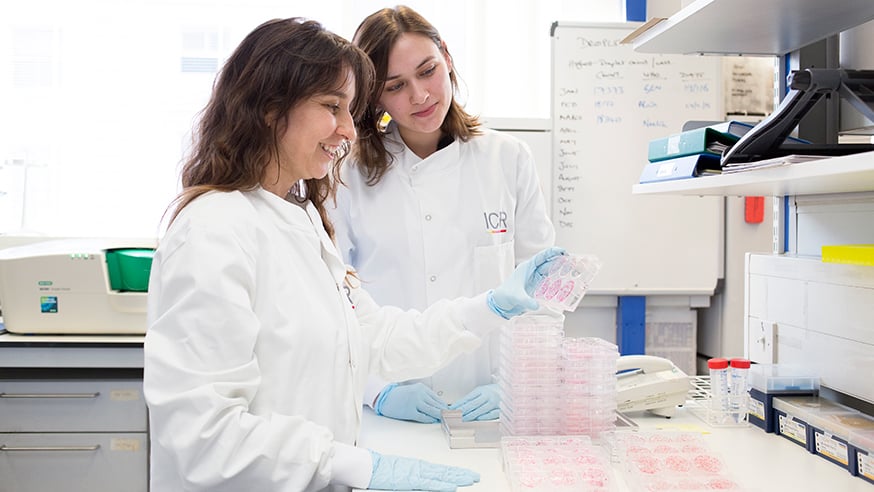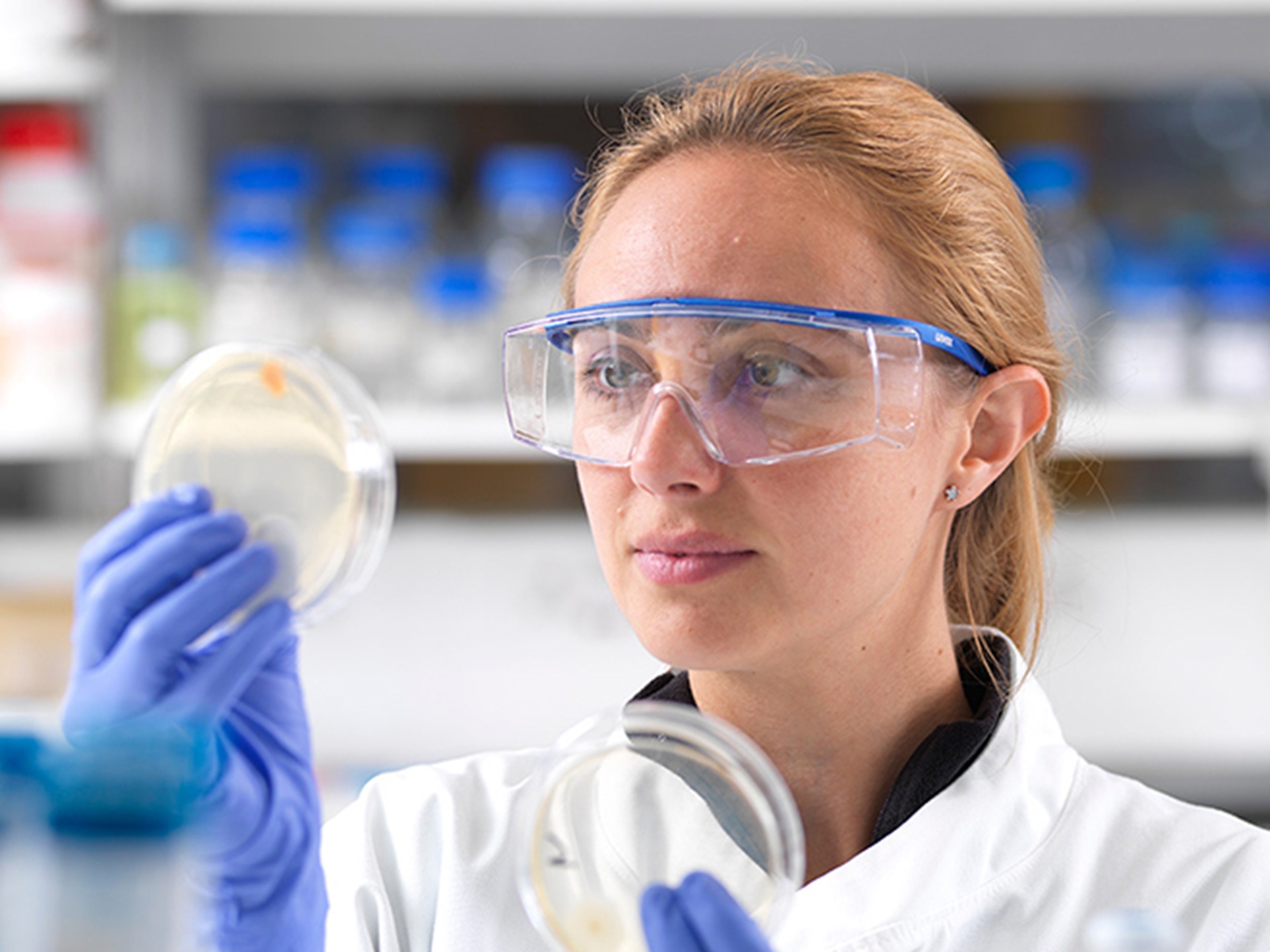
At the ICR, we are working to implement new and better processes for equality of opportunity, to create a culture where everyone feels welcome and able to make the most of their talent.
Our work to promote equality for women in science is led by our Athena SWAN Steering Group, which I co-chair with our Chief Executive, Professor Paul Workman. This group brings together representatives from across the ICR to work together to address gender inequality in, and remove barriers to, career progression in higher education and research.
We oversee the ICR’s actions to promote gender equality, especially women’s careers in research, and share our learning with research partners and across the wider scientific community.
The importance of diversity
All research benefits from having a diverse workforce – which includes and goes beyond gender equality. There are plenty of stats to show that greater diversity leads to improved organisational performance.
Working in an environment where you feel valued and where you have equal opportunities allows you to realise your own potential.
In science, we are working creatively at the boundaries of current knowledge – and we need to be able to incorporate ideas from many different points of view and backgrounds to make sure we are drawing on the best talent.
Because scientific careers are very mobile and there is a great deal of communication and visibility in the scientific community, our efforts will also have impact beyond the ICR, so it’s important that we do our best. This is true for all our colleagues in different roles across the higher education sector nationally and internationally.
Professor Jessica Downs is investigating the interplay between epigenetics and genome stability. The goal of this research is to understand how the packaging and organisation of DNA in cells helps to maintain its integrity and prevent tumourigenesis.
Issues we face in striving for gender equality
Often when we talk about the issues facing women in their careers, we talk about things like childcare and family responsibilities. These are of course important concerns, but importantly in my mind, eminently solvable.
The ICR has been doing a lot of work to support families with young children, including doubling the number of nursery places at our Sutton site, providing costs of childcare for residential courses arranged by Learning and Organisational Development, and working with parents in Chelsea to explore how we can expand children’s access to our laboratory buildings – and there is much more that we can and will do.
Other practical steps the ICR has taken include enabling networking for scientists within work hours – and we have spoken publicly on the importance of this issue. We have also implemented new guidance for our staff on holding meetings inside the working day.
These are all important, practical solutions that enable women in particular to keep in the loop, and at the centre of discussions.
Perceptions and assumptions
More challenging are the perceptions and assumptions about gender roles that still do impact all of us in the way we think and behave.
How can we challenge what is known as the ‘leaky pipeline’ phenomenon, where men and women show equal potential for and uptake of the sciences at school and undergraduate level, but where the proportion of women drops as you progress up the career ladder?
About 30 per cent of our scientists at Team Leader level are women (compared to around 50 per cent of postdocs), and we know this is consistent with the proportion of applications we have. How can we encourage more women to apply for scientific leadership positions?
The ICR is taking steps to address this. Steps we have taken so far include changing the promotion structure to take into account time taken for maternity leave.
We ‘stop the tenure clock’ for those in time-limited research roles (including postdocs, tenure-track Faculty and their clinical equivalents) who take long-term leave including maternity, shared parental leave and long-term sickness leave.
We also provide maternity cover for tenure-track Faculty to provide support laboratory management when on leave. Through measures such as these, we hope to encourage women to stay in academia and to progress to leadership roles.
We also support personal development for staff across the whole organisation. All Career Development Faculty have a mentor who is not their line manager, and a mentoring scheme for postdocs is in development.
We run leadership programmes for everyone from students to Team Leaders. We also run two junior leadership training schemes annually – the Future Leaders development programme and Aurora, a women-only programme.
We closely monitor our progress, through statistics on women’s careers and through research into people’s experiences of working here, to understand what impact our work is having, and what more there is to do.
The leaky pipeline
I’ve absolutely seen a drop off in female colleagues as I’ve progressed in my career. It’s is not something you can ignore. I have often been the only woman present at a committee meeting, which is important as these are the places where decisions get made.
I’ve also experienced situations all my female colleagues will recognise – asked if I am taking notes, getting talked over in meetings, being asked if I am at a conference as someone’s wife...
I do want to stress that these experiences are the exceptions, and I have had a hugely positive experience as a woman working in science, with support from colleagues, male and female. However, I do think these experiences are important to acknowledge, as they do have an impact.
I hope and believe colleagues today are having an increasingly positive experience starting out. There is a tangible shift in attitudes which you can see reflected in the much wider global discussions taking place across all industries.
In our Science Talk blog post – Addressing career inequalities in cancer research – we spoke to Dr Vanessa McKean, Equality, Diversity and Inclusion Manager, about the ICR’s work to embed equality in everything we do.
Advice for aspiring scientists
I have three main pieces of advice for any younger female colleagues, but this really can apply across the board.
- Create a support network. Seek out senior women around you and ask them to share their stories for how they got to where they are.
- Work on building your confidence. Do things that are outside your comfort zone at work, apply for things and take risks. Rejections are part and parcel of working in science – from peer review in journals, to applying for grants or positions. Think of rejections as sharpening your game – they don’t have to be unpleasant or sink you. Remember that science is fun, and do it because you enjoy it!
- Building a family and a career is possible – you only have to look to see many successful women who have achieved this. Childcare is a practical, solvable issue, and help is available. What’s more, working in research is actually a very flexible job, and one you can build your family around.
The challenge
The biggest challenge for all institutions is to create a work environment where all people, regardless of their gender or race or any other characteristic, are welcomed and supported at all levels.
The need for constant self-evaluation and monitoring is important. Many factors related to gender equality are not conscious, such as the bias people have when making hiring decisions. It’s important to refresh these ideas and not become complacent.
Gender imbalance can also manifest in many ways. At the ICR we are seeing far more women than men doing public engagement activities, for example. Whilst it’s great for young girls and women at school to be seeing and hearing from women in research, boys need that inspiration too!
I think it is important for everyone to take a step back sometimes and think about how you can support and encourage one another in your workplace. We can all be part of the change that is needed.
And finally – challenge yourself! No one should limit their own capabilities.
